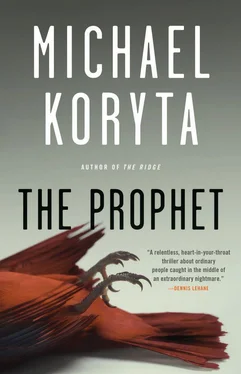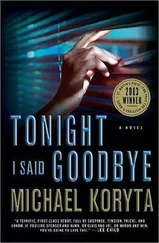“They’ll find him, Beth,” he said.
She kept her head down for a moment, then lifted it and stepped away, leaving the door cracked open even though their daughter was adamant about sleeping with the door closed.
“I know they will,” she said. She had moved to Andrew’s door, and Kent joined her there, watched his sleeping son. A nightlight kept a dim glow, shadows around it. Earlier that fall, Kent had been talking on the phone while Andrew played in the driveway with a basketball that was far too big for him. It was getting on toward evening, and when Kent turned to the window he saw his son on the pavement with pools of blood spreading away from his head.
He dropped the phone in mid-sentence, and the plastic case cracked when it hit the tile floor. Was out the door with a scream in his throat when Andrew sat up and smiled at him.
It had been shadows, nothing more. The way he was lying there in the fading light, they’d looked like blood all around him. Kent carried Andrew in, picked up the phone, and apologized, tried to joke it off. “You’ve seen the kid’s balance—it was a reasonable concern.” Then he excused himself, went into the garage, and sat on the workbench stool until his hands stopped shaking.
Not my children, he’d thought that night, a desperate plea, not mine, not mine, not mine. Tragedy will make its daily appearance, I know that, but please, God, not at my door. Not again.
“What are you thinking?” Beth said.
That Sipes could have started with us, he thought. That instead of Rachel, it might have been Lisa.
“Maybe we should leave,” he said.
“What?”
“For a while. Until they sort it out. Give the police time to find him.”
“You want us to hide somewhere? Take the kids out of school? You quit coaching?” She shook her head. “If the police thought that was necessary, you’d know it.”
It was what he needed to hear her say, it was the return to the calm strength he needed, the kind she’d provided to him so many times over so many years. And yet, somehow, it didn’t steady him the way it usually did. She hadn’t met Clayton Sipes. She hadn’t seen his eyes.
Beth was saying, “We don’t even know for sure that it’s him,” when there was a hammering on the front door. Three rapid reports— thud, thud, thud.
For a moment they both looked at each other uneasily, and then a voice called, “It’s just me, Franchise,” as if Adam could see through the walls of the house and knew exactly how they were reacting, knew that they were scared.
“Adam,” Kent whispered, and when he turned to go to the door, Beth reached out and caught his arm. He looked back at her and said, “It will be fine,” though he wasn’t sure how he knew that. The last time Adam had come to their home it had not been fine.
He went downstairs and opened the door. Adam stood with his hands in his jacket pockets, and beyond him there was an old Corvette. Kent could make out Chelsea sitting behind the wheel. The engine was still running. Evidently they did not intend it to be a long stop.
“Hey,” Kent said. “I’m sorry. It unfolded fast, but I should have called you.”
Adam lifted his hands, palms out, a placating gesture. “Not a problem. Not a problem. It was a rough situation all the way around.”
There was something false in it. He was too conciliatory. Allowing access to Marie’s room was a cardinal sin, Kent knew that.
“You doing okay?” Adam asked.
“Yeah.” Kent hesitated, then said, “You? How serious are those charges?”
“Ah, we’ll figure it out, right? I mean, I’m clean, so they’ll plea bargain.”
“If there’s anything I can do to help…”
It sounded pathetically formal, stilted. Adam gave a wan smile, glanced back at Chelsea in the car, and then returned his focus to Kent, and the smile was gone.
“Who left the letter?”
Kent was silent. His only operating instructions from the FBI were not to disclose his suspicions about the identity of Rachel Bond’s killer.
Adam leaned his head to the side. “Kent?”
“I don’t know.”
“Bullshit,” Adam said, and there was bite to his tone that made Beth come down the steps. He looked over Kent’s shoulder and saw her and there was a pause as they studied each other, Kent trapped in the middle of the gaze.
“Relax,” Kent said, and he wasn’t sure which one of them he meant to direct it to.
“Salter told me the guy who left you the letter was one of your buddies from the prison,” Adam said. “Someone who was in my home. Tell me who he is, Kent.”
Kent said, “I haven’t even talked to Salter.”
“No. You talked to the FBI.”
He knew that much, then. What detail they had provided to him Kent couldn’t guess beyond the obvious fact that they had not inquired about Clayton Sipes directly. Kent took a deep breath and said, “Adam, I’m sorry. For all of it. But you need to go home, keep your head down, and stay out of trouble. There’s nothing in this for you but—”
“He killed her, you son of a bitch,” Adam said, the words rising in volume but not in speed, no rush to temper, just a steady climb toward the summit of rage. “At least I’ll admit that I sent her to him, but you brought him here. How are you going to handle that? Are you going to pray with him again, Kent? He put a bag over that girl’s head and watched her drown inside it, do you understand that? Do you have…”
He had just taken his hands from his pockets and coiled them into fists when he came to a stammering stop. Whatever words—or punches—had been about to come were lost as fast as embers beneath rain. Kent saw the change and turned his head to follow his stare.
Lisa was awake. Standing at the top of the stairs in her pajamas, eyes bleary but concerned, staring down at them. Watching her uncle.
Kent said, “Beth,” but Beth was already moving, taking their daughter and shuffling her toward the bedroom, whispering that everything was fine. By the time Kent looked back to Adam, his brother was stepping away.
“You need to think about them,” Adam said, gesturing at Kent’s wife and daughter. “I know what you believe, Kent, I know how you are, I know who you’ll trust. Salter, the FBI. And I know that you look at me and you see… shit, I don’t even know what you see. But I can tell you that it’s wrong. What I’m thinking about is exactly what you should be thinking about. I’m going to have to answer for what I’ve done. You will, too.”
There was no heat to his words. His eyes were still on the spot where Lisa had just been standing, and he looked as troubled as Kent ever remembered seeing him, as unsteady.
“We’re both going to have to answer for it,” he said, and then he turned and walked off the porch and back to the Corvette.
27
ONE OF KENT’S STRUGGLES, and they were many, was with his language. Locker room talk was a product of testosterone, nerves, and macho competition. Always had been, always would be. Kent, who had been raised in locker rooms, and whose father had been one of the most impressively profane individuals he’d ever known— The secret, boys, is in the verbs. Everyone uses the adjectives, but you’ve got to pick unique verbs— wanted to run a clean locker room. That started by keeping his own tongue in check, which was a far more difficult ordeal than anyone probably would have guessed. He’d been nurtured on profanity; it came as a reflex.
That morning he got as far as “worthless cock—” and was about to employ the unique verb when he saw his son’s head snap up. Kent bit down the rest of the sentence, and that was too bad in a way because it was one that would have impressed the heck out of his coaches, who didn’t think he had it in him. Neither, though, did his son, and he wanted to preserve that for as long as possible.
Читать дальше












